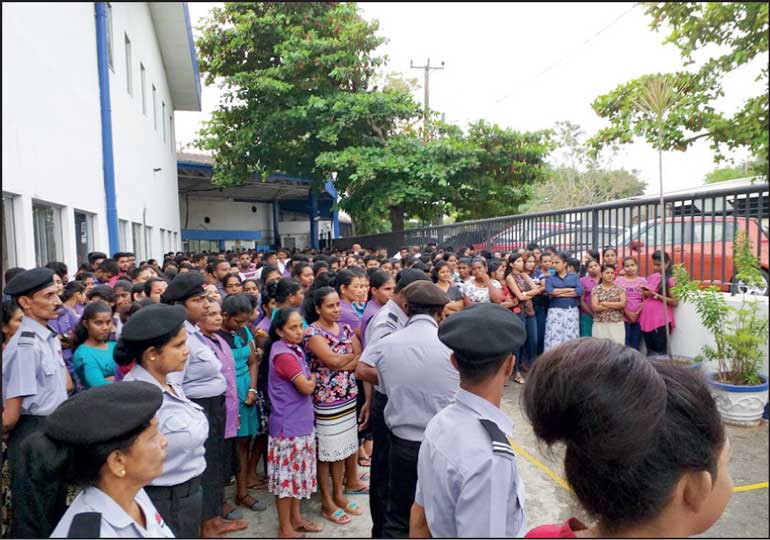
Employees wait outside the factory this morning (ft.lk)
NEXT Manufacturing, a British-owned apparel exporter operating in Sri Lanka since 1978, has announced the indefinite closure of its Katunayake Production Plant, citing rising operational costs and persistent unprofitability, in a blow to Sri Lanka’s already struggling economy.
The factory’s sudden shutdown on 20 May left over 1,400 workers without jobs and sparked concern across the Free Trade Zone (FTZ), where the plant had long been a major employer.
Employees said they were shocked by the abrupt move, with many reporting that they had received no prior warning before arriving to find the factory gates locked. Only security personnel remained on-site, confirming that no management officials were present to provide further information.
The factory, located in the Katunayake FTZ, had primarily exported garments to London and was one of Sri Lanka’s flagship British investment projects in the apparel sector. According to the company’s statement, the decision was taken “after exploring all alternative options,” but ultimately NEXT concluded that the plant had become “economically unviable.”
“At the heart of this decision is the increasingly high operating cost of the Katunayake Manufacturing Plant. For some years now, the plant has been unprofitable, and despite our considerable efforts to rectify the situation, we have been unable to make the factory economically viable,” said David Reay, Director of NEXT Manufacturing.
He added, “Recently, it has become clear that there is no prospect of this changing.”
Redundancies and compensation
In total, 1,416 workers will lose their jobs as a result of the closure. NEXT has pledged to pay affected employees a severance package above the statutory minimum, with a cap of LKR 2.5 million based on years of service. Departing workers will also receive payments covering the remainder of May, any outstanding holiday pay, bonuses, and gratuity.
The company also said it will assist workers in finding alternative employment and has already begun contacting other manufacturers to explore redeployment options.
Although the Katunayake Production Plant is shutting down, NEXT confirmed that its other Sri Lankan operations will continue. The Embellishment and Product Development Plants, also located in Katunayake, will remain open with a reduced workforce. Additional manufacturing centres in Andigama and Nawagaththegama (NMA 2, NMA 3, and NMA Cutting) will also remain unaffected, as will the company’s Colombo sourcing office.
Industry under pressure
The closure of the Katunayake facility is a significant blow to Sri Lanka’s apparel manufacturing sector, which has faced mounting economic challenges in recent years. Industry analysts have cited escalating labour costs, energy expenses, and fluctuating export markets as major constraints. Labour costs in particular have been highlighted as a concern, with some suggesting that no investor would find it viable to continue operations in such a context.
Despite Sri Lanka’s status as a hub for apparel exports, global competition—particularly from countries with lower production costs—has placed significant pressure on domestic manufacturers. NEXT’s withdrawal from Katunayake adds to a growing list of factory closures and labour displacements across the island.
Authorities and labour unions have yet to issue an official response to the factory closure. For the nearly 1,500 workers now facing unemployment, the news has deepened uncertainty in an already precarious economic climate.
